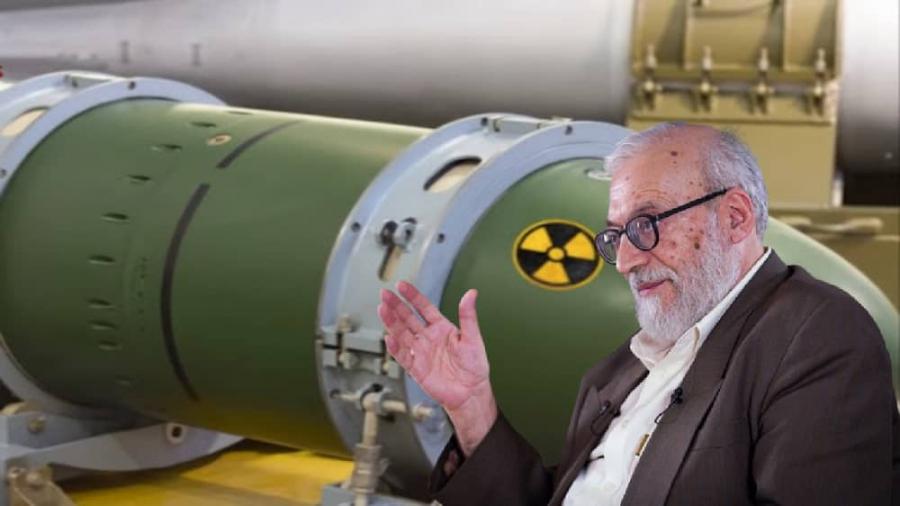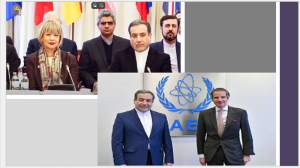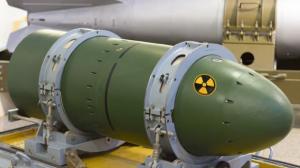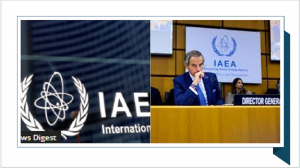
(Video) Iran: Larijani Claims Tehran Can Achieve Military Nuclear Readiness in 24 Hours
Foreign Minister Abbas Araqchi warned, "That any resolution against Iran at the IAEA would trigger reciprocal measures, including further nuclear advancements"
PARIS, FRANCE, November 22, 2024 /EINPresswire.com/ -- The National Council of Resistance of Iran (NCRI) Foreign Affairs Committee in an article reported that in a provocative statement on state television, Mohammad Javad Larijani, a senior official and close ally of Supreme Leader Ali Khamenei, declared on Monday, November 18, that Iran has the capability to achieve “military nuclear readiness” within 24 hours.
“If Europeans think we can achieve nuclear military capability within 48 hours, they are mistaken we can do it in 24,” Larijani stated, emphasizing this capability as a key deterrent. He also warned that Tehran would swiftly recalibrate its nuclear policies in response to any perceived threats or pressure, adding, “Our nuclear capability is unstoppable, and any threat will be met with a decisive response.”
This statement comes amid escalating tensions with the International Atomic Energy Agency (IAEA) and European nations. France, Germany, and the UK are advocating for a resolution at the upcoming IAEA Board of Governors meeting to censure Iran for its non-compliance with nuclear agreements.
Tehran has consistently obstructed inspections, failed to clarify uranium traces found at undeclared sites, and enriched uranium to 60% purity a level dangerously close to weapons-grade.
Despite Masoud Pezeshkian’s recent statements and assurances during a meeting with IAEA Director General Rafael Grossi claiming that Tehran will never strive for nuclear weapons and that it is committed to “addressing ambiguities” in its nuclear program “within legal frameworks”
The regime’s actions tell a different story. While Pezeshkian spoke of cooperation, Tehran has consistently obstructed inspections and defied transparency requirements, as Grossi himself highlighted.
This duplicity underscores the regime’s strategy of offering hollow promises to buy time while advancing its nuclear ambitions and escalating threats, as evidenced by Larijani’s remarks about achieving military nuclear readiness within 24 hours.
Larijani’s remarks are the latest in a series of aggressive statements by Iranian officials showcasing the regime’s escalating nuclear posture. Earlier this year, Kamal Kharrazi, a senior advisor to Khamenei, hinted at a possible shift in Iran’s nuclear doctrine, suggesting the regime might pursue nuclear weapons if faced with an “existential threat.”
In May, Fereydoon Abbasi, a former head of the Atomic Energy Organization, also alluded to Iran’s technological capacity to produce nuclear weapons, emphasizing that the country possesses the necessary materials and expertise.
Additionally, Iranian officials have used nuclear rhetoric as a tool for regional intimidation. Parliamentarian Ahmad Naderi recently advocated for testing a nuclear weapon, arguing that regional balance could only be achieved through nuclear deterrence.
This rhetoric aligns with threats from Islamic Revolutionary Guards Corps (IRGC) officials, including veiled warnings to European nations and regional neighbors, emphasizing Iran’s willingness to retaliate against perceived aggression.
Larijani’s threats underscore Tehran’s familiar strategy of deflection and intimidation. Facing potential new sanctions from the European Union targeting its shipping industry for facilitating missile transfers to Russia, Iran is amplifying its nuclear rhetoric to stave off international pressure.
Foreign Minister Abbas Araqchi recently warned that any resolution against Iran at the IAEA would trigger reciprocal measures, including further nuclear advancements.
This brinkmanship has further isolated Tehran, as regional and international powers grow increasingly wary of its intentions. Reports earlier this year of failed missile and drone strikes against Israel, intercepted by coordinated defenses involving multiple nations, highlighted Iran’s technological limitations despite its belligerent rhetoric.
The regime’s threats and defiance come as its domestic and international challenges mount. Tehran faces growing unrest at home, an economy crippled by sanctions, and potential shifts in U.S. foreign policy with the return of Donald Trump to the presidency in January 2025.
Trump’s “maximum pressure” campaign during his previous term severely impacted Iran’s economy, and Tehran appears anxious about the possibility of similar policies being reinstated.
As the Iranian regime doubles down on its nuclear blackmail, the international community must respond decisively. Sanctions, coupled with robust enforcement of nuclear agreements, are critical to curbing Tehran’s destabilizing activities.
At the same time, global powers must support the Iranian people’s demands for fundamental change, recognizing that sustainable peace in the region depends on holding Tehran accountable for its actions.
Larijani’s remarks, alongside the regime’s history of threats and defiance, are yet another reminder of the urgent need for unified and resolute action to address Tehran’s nuclear ambitions. The upcoming IAEA Board of Governors meeting must result in a strong resolution against the Iranian regime.
Additionally, members of the Joint Comprehensive Plan of Action (JCPOA) should activate the snapback mechanism to respond firmly to Tehran’s escalating threats and ensure it faces the consequences of its actions.
On November 18, 2024, AFP reported that the Iranian regime is set to face new sanctions due to its lack of cooperation with the International Atomic Energy Agency (IAEA).
At the UN nuclear agency’s meeting, European diplomats, with backing from the United States, introduced a plan to adopt a resolution against Iran. The meeting, scheduled to begin on Wednesday, highlights escalating tensions between Iran and the IAEA.
Rising Tensions Since the Collapse of the Nuclear Deal
Relations between Iran and the IAEA have steadily deteriorated since the collapse of the 2015 nuclear agreement. Brokered during Barack Obama’s presidency, the deal imposed strict limits on Iran’s nuclear program in exchange for sanctions relief, while evidence showed that the deal was not able to prevent the regime from expanding its malign nuclear activities.
Thus, the Trump administration withdrew from the deal in 2018, accompanied by a “maximum pressure” campaign in response to the regime’s hidden activities.
Evidence showed that the regime was enriching uranium to 60% purity, a level just shies of the 90% required for weapons-grade material, making it the only non-nuclear state to achieve such levels. Since then, while Tehran has repeatedly denied pursuing nuclear weapons, international concerns about its rapidly expanding nuclear program continue to grow.
A Confidential Push for Accountability
According to a confidential draft obtained by AFP, Western powers are demanding a comprehensive report from IAEA Director-General Rafael Grossi on Iran’s nuclear activities. This report is expected to address Tehran’s cooperation regarding uranium traces discovered at undeclared sites.
Grossi’s recent visit to Iran, which included meetings with Iranian President Masoud Pezeshkian and inspections of key facilities in Natanz and Fordow, was seen as a last-ditch effort to ease diplomatic tensions.
However, Kelsey Davenport, Director for Nonproliferation Policy at the Arms Control Association, dismissed the visit as “a missed opportunity for Pezeshkian to demonstrate that he is serious about de-escalation.” And added: “Grossi’s visit to Tehran was… too little and too late to stave off a censure from the board.”
“Taking tangible steps to enhance IAEA oversight of Iran’s nuclear program and address the agency’s questions about past undeclared nuclear activities would have quelled speculation that Iran is engaged in illicit nuclear activities,” Davenport said.
Iran’s Mixed Signals and Defiance
During Grossi’s visit, Pezeshkian called for nuclear negotiations free from political pressure, expressing Tehran’s readiness to address ambiguities. Despite these statements, fears of a return to the Trump administration’s hardline policies are clouding diplomatic efforts.
Adding to the tension, Mohammad-Javad Larijani, a senior adviser to Supreme Leader Ali Khamenei, made provocative remarks in an interview with Iranian state television.
Referring to the regime’s nuclear capabilities, Larijani claimed, “If the Europeans believe we can develop a nuclear military capability within 48 hours, they are not mistaken. In fact, we can shorten this time to 24 hours. This is our deterrent power.”
Rejecting claims of a deadlock in Iran’s policies, Larijani warned, “Iran’s nuclear capabilities are unstoppable, and any threat will face a decisive response.”
Hassan Ghashghavi, a member of the Iranian parliament, pointed to the regime’s “Strategic Action Plan,” which mandates immediate retaliation if international institutions take adverse actions against Iran. Backed by Khamenei, the law obliges the regime to respond to any perceived violations of its nuclear rights.
Diplomatic Standstill as Vienna Meeting Looms
Ahead of the crucial IAEA Board of Governors meeting in Vienna, reports suggest Iran has offered to limit its stockpile of uranium enriched to 60% purity, conditional on the absence of a censure resolution. Confidential IAEA documents indicate Tehran has prepared to cap its stockpile and is open to allowing four additional IAEA inspectors.
However, Western powers, citing Iran’s history of non-compliance, remain unconvinced. Diplomats told Reuters that despite Iran’s offer, a censure resolution is likely to proceed.
Conclusion
As the IAEA meeting approaches, the prospect of new sanctions and heightened scrutiny over Iran’s nuclear activities raises the stakes for diplomacy. Tehran’s defiance, paired with its conditional offers, underscores the complexity of negotiations and the fragile state of international efforts to rein in Iran’s nuclear ambitions.
The coming days will be decisive in determining whether appeasement prevails or the confrontation between the regime and the international community escalates further.
If you wish to receive the NCRI weekly Newsletter, please use the following link to subscribe: https://bit.ly/3SMgEla.
Shahin Gobadi
NCRI
+33 6 61 65 32 31
email us here
While Pezeshkian spoke of cooperation, Tehran has consistently obstructed inspections and defied transparency requirements as Grossi himself highlighted.
Distribution channels: Human Rights, International Organizations, Politics, U.S. Politics, World & Regional
Legal Disclaimer:
EIN Presswire provides this news content "as is" without warranty of any kind. We do not accept any responsibility or liability for the accuracy, content, images, videos, licenses, completeness, legality, or reliability of the information contained in this article. If you have any complaints or copyright issues related to this article, kindly contact the author above.
Submit your press release




